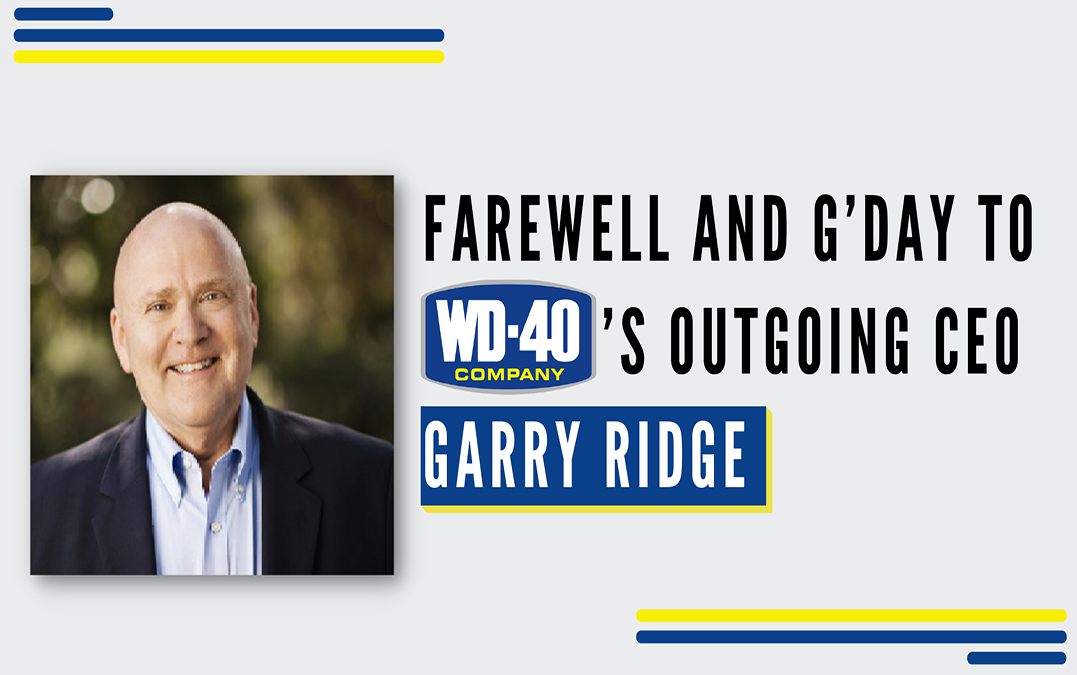
Farewell and G’day to WD-40’s Outgoing CEO Garry Ridge

6.5 years ago, when a San Diego-based client asked for our help to codify their core values, I immediately reached out to WD-40 CEO Garry Ridge. I was first charmed by Garry when I heard him speak at a leadership conference. His Australian accent, the catch in his voice when sharing a story about balancing the weight of leading a publicly-traded company while making time to be a good soon to his aging mother, the self-deprecating humor, made Garry one of the most approachable speakers I’d heard. And when I emailed Garry to ask if he would be willing to host my client for a “culture field trip” to WD-40, his response was an unqualified yes.
I explained to my client that in order to accelerate their work, I wanted them to experience what it looks like when a company’s core values are hard-wired into their behaviors and, ultimately, organizational performance. This basic connection is true for every organization. The key difference is that a few leaders like Garry Ridge take personal responsibility for codifying the connection between culture and performance. They don’t outsource it to HR or delegate to Marketing. They live it and model it every day.
When I showed up at the WD-40 headquarters with my clients to learn about this culture connection, Garry Ridge personally met us at the door and led us through a one-and-a-half-hour tour. Here are three of the top takeaways we heard from Garry on that culture field trip:
- Create a learning environment. When Ridge was promoted from within as CEO, he knew that growth was being held back partly due to deep silos within the organization. “Those who knew the most about how things worked guarded that knowledge, which gave them power,” Ridge said. He immediately set to work to define the concept of learning moments. Over time, he built trust in the concept by showing that no one would be punished for trying something new and sharing knowledge about what worked and what did not. At today’s WD-40, knowledge is shared and information moves easily.
. - Personalize accountability and responsibility. In Helping People Win at Work, a book co-authored with Ken Blanchard, Ridge shares the unique WD40 performance review system. Employees develop measurable, achievable goals that will help the company reach its annual strategic targets. They describe what ‘A’ work looks like, rate their own progress each quarter, and review these ratings with their manager. The manager’s role is to help employees achieve all As. Ridge says, “If you help your people get As, your performance management system will ignite them to blow away your customers with outstanding service. Because people who feel good about themselves want to return the favor.”
. - Get your values off the wall. WD-40 doesn’t just want good performers, it wants good performers who are also good citizens. Ridge believes that values must be at the core of your business model, not just words engraved in a plaque on the wall. Not only does the company have six, clear-to-understand values, but they are ranked in order of importance. He explained, “Life is about values conflicts. When these conflicts arise, people need to know which value to focus on.” Employees are taught the values at orientation, assigned to ‘tour guides’ to help explain values in action, and hold themselves accountable for demonstrating the values, which make up 30% of their performance review.
 On August 31st of this year, Garry is stepping down as CEO of WD-40 after 25 years of service. He plans to launch a consulting practice called The Culture Coach. I, for one, look forward to supporting Garry in this next chapter just as he has so graciously supported mine. So, farewell to Garry as WD-40 CEO and G’day to your new, exciting role!
On August 31st of this year, Garry is stepping down as CEO of WD-40 after 25 years of service. He plans to launch a consulting practice called The Culture Coach. I, for one, look forward to supporting Garry in this next chapter just as he has so graciously supported mine. So, farewell to Garry as WD-40 CEO and G’day to your new, exciting role!

